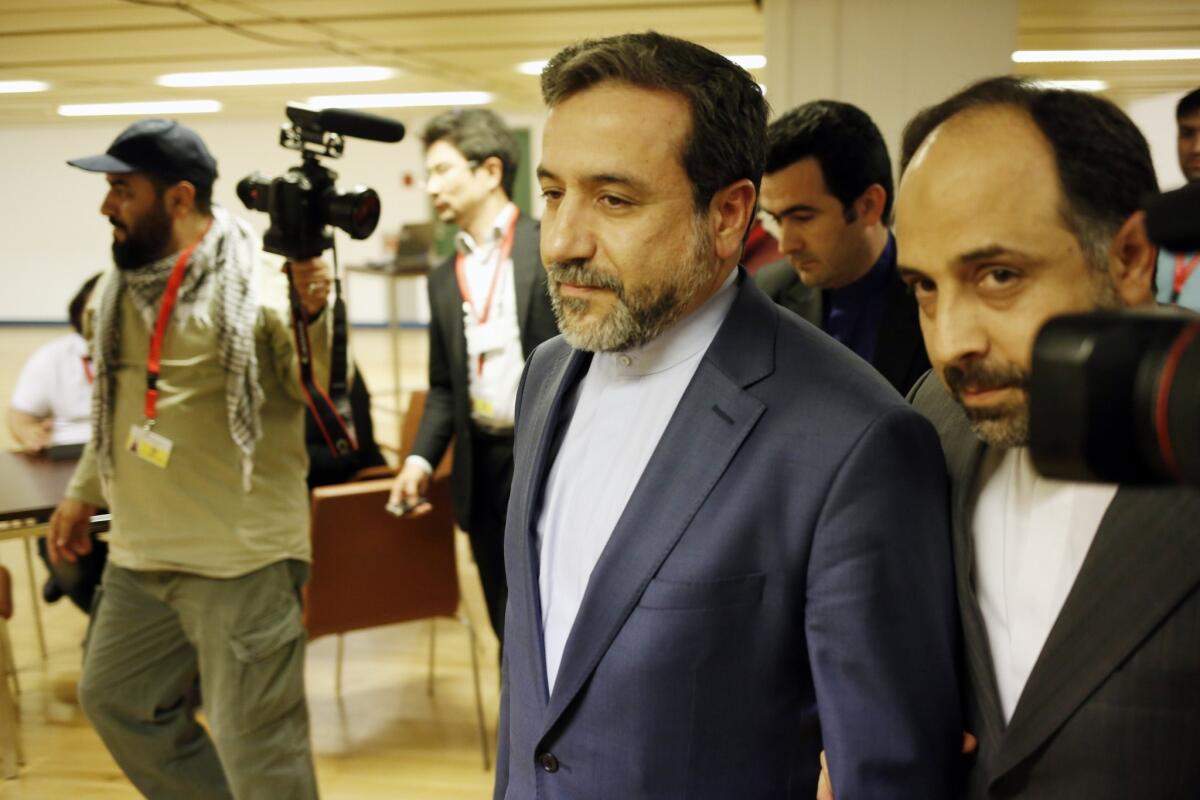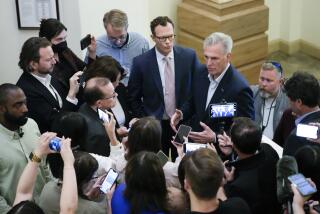Given the unpalatable options, Iran nuclear talks may be extended

Reporting from Washington â Negotiations for a nuclear deal with Iran may be extended if an agreement canât be reached by the Nov. 24 deadline, a senior Iranian official said Friday, offering the strongest signal yet that Tehran and world powers may prefer a continuation of inconclusive diplomacy to a risky collapse of talks.
Deputy Foreign Minister Abbas Araqchi said in an appearance in the Iranian city of Masshad that âeverything, including an extension, is possible if we cannot reach an agreement,â according to the semiofficial Fars News Agency.
Iran and six world powers remain deadlocked on key issues in the talks. The negotiations aim to produce a deal that would ease economic sanctions on Iran if it agrees to halt its disputed nuclear program short of bomb-making capability.
Negotiators for the group have so far remained vague on what would happen if the deadline is not met, but some diplomats and outside experts have urged them not to abandon talks that have offered hope for a resolution of one of the worldâs top security issues.
Advocates for the talks argue that continuing the current interim nuclear agreement, which took effect at the beginning of this year, would preserve important limits on Iranâs nuclear activities.
The interim deal prevents Iran from resuming production of higher-grade uranium and from working on advanced centrifuges, the machines that can produce material for bomb fuel.
In return, the United States and other world powers agreed to roll back some economic sanctions against Iran. Those concessions are relatively minor and largely keep the most severe penalties in place, Western officials say.
By contrast, a halt in negotiations would allow Iran to resume greater uranium enrichment at higher levels and would raise the risks of war at a time when the Middle East is already embroiled in multiple crises, supporters of the talks say.
âThe option of simply throwing in the towel and calling it quits is not something that appeals to any of the parties,â said Robert Einhorn, a former top administration official who is with Brookings Institution. âClearly, the Iranians, from Araqchiâs comments, are anticipating extending the talks.â
Representatives of the U.S., part of a group of powers that also includes France, Britain, Germany, Russia and China, have been vague on what they will do if the talks do not produce a deal in November. But they have not ruled out an extension.
A continuation of the talks offers some advantages for Iran as well. If the talks end without a deal, the government of President Hassan Rouhani could face heavy domestic criticism for failing to fulfill his promise to end the sanctions, which have battered Iranâs economy. Rouhani and his team could also face tough criticism if they agreed to a deal that fell short of the ambitious requirements Iran has set for an agreement.
Those skeptical about the talks, including many members of Congress, contend that Iran has been seeking only to run out the clock and would never accept limits that would take away its nuclear weapons option. Iran insists that it has no interest in building a bomb.
But opposition to an extension of diplomacy appears to have softened among Israeli officials, whose opinion is key to many in Congress and the Obama administration. Many key Israelis would prefer an extension of the talks to a deal that they fear could open the way to Iranâs crossing the nuclear threshold.
âIâd prefer another interim agreement to a bad deal,â Zalman Shoval, a former Israeli ambassador to the United States and an advisor to Israeli Prime Minister Benjamin Netanyahu, said in an interview this month.
There are two general approaches for extending the talks.
One would be simply to continue negotiations under the current terms.
A second approach would require a new interim deal that would add restrictions on Iranâs nuclear activities in return for a further easing of sanctions. Such a deal could build on progress that the negotiators have made in some areas, such as in the treatment of Iranâs heavy-water nuclear reactor at Arak, which Western officials fear could be used to produce plutonium for weapons.
Reaching a new interim agreement would be difficult but would allow the administration to argue to Congress that further talks are justified.
Skeptics in Congress, however, are already making it clear that they are unhappy with the apparent compromises on Arak and other disputed areas.
There is a risk that congressional opponents could impose tough new sanctions on Iran that could drive Tehran away from the negotiating table, especially if Republicans win the Senate in the midterm elections, say diplomacy advocates.
Some analysts have long predicted that the talks would drag on for years because the two sides, while unwilling to risk big concessions, want to avoid a dangerous confrontation.
In that scenario, the negotiations could become similar to the Israeli-Palestinian peace talks, continuing year after year with only minor progress but avoiding collapse or a fundamental resolution of the issue.
âThis is already the second-longest unresolved negotiation in the Middle East,â said Ray Takeyh, an Iran specialist at the Council on Foreign Relations, noting that Iranâs nuclear talks with European countries began in 2002.
Special correspondent Ramin Mostaghin in Tehran contributed to this report.
More to Read
Sign up for Essential California
The most important California stories and recommendations in your inbox every morning.
You may occasionally receive promotional content from the Los Angeles Times.











